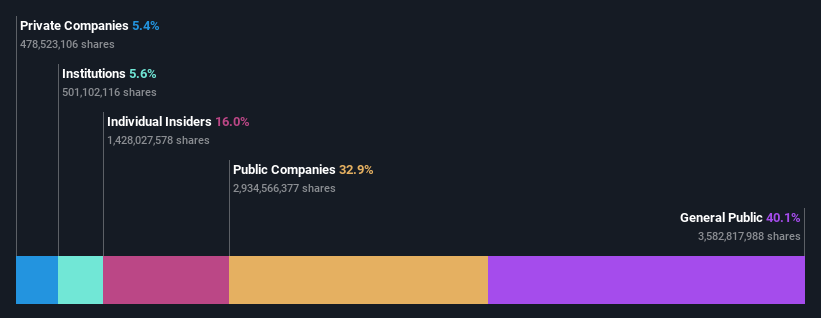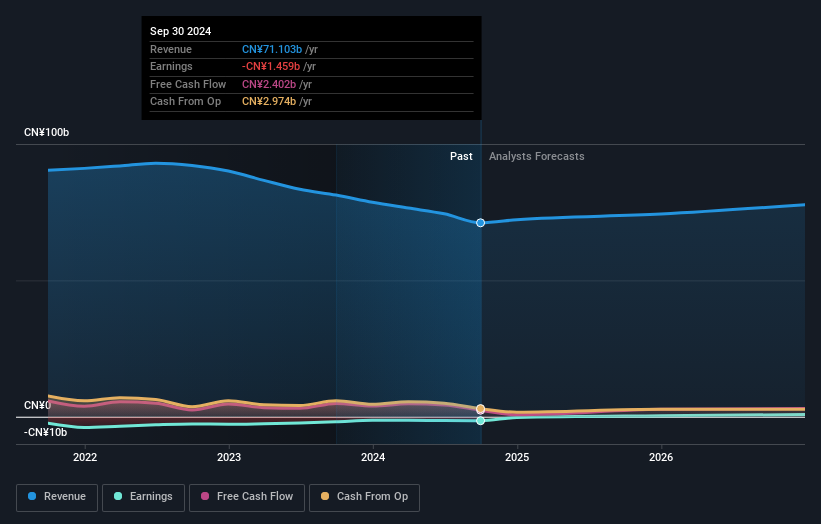- China
- /
- Food and Staples Retail
- /
- SHSE:601933
Yonghui Superstores Co., Ltd.'s (SHSE:601933) stock price dropped 22% last week; individual investors would not be happy

Key Insights
- The considerable ownership by individual investors in Yonghui Superstores indicates that they collectively have a greater say in management and business strategy
- The top 5 shareholders own 54% of the company
- Insider ownership in Yonghui Superstores is 16%
If you want to know who really controls Yonghui Superstores Co., Ltd. (SHSE:601933), then you'll have to look at the makeup of its share registry. With 40% stake, individual investors possess the maximum shares in the company. In other words, the group stands to gain the most (or lose the most) from their investment into the company.
And last week, individual investors endured the biggest losses as the stock fell by 22%.
In the chart below, we zoom in on the different ownership groups of Yonghui Superstores.
See our latest analysis for Yonghui Superstores

What Does The Institutional Ownership Tell Us About Yonghui Superstores?
Institutions typically measure themselves against a benchmark when reporting to their own investors, so they often become more enthusiastic about a stock once it's included in a major index. We would expect most companies to have some institutions on the register, especially if they are growing.
We can see that Yonghui Superstores does have institutional investors; and they hold a good portion of the company's stock. This suggests some credibility amongst professional investors. But we can't rely on that fact alone since institutions make bad investments sometimes, just like everyone does. It is not uncommon to see a big share price drop if two large institutional investors try to sell out of a stock at the same time. So it is worth checking the past earnings trajectory of Yonghui Superstores, (below). Of course, keep in mind that there are other factors to consider, too.

Hedge funds don't have many shares in Yonghui Superstores. The company's largest shareholder is Jardine Matheson Holdings Limited, with ownership of 21%. With 11% and 8.9% of the shares outstanding respectively, JD.com, Inc. and Xuan-Song Zhang are the second and third largest shareholders. Xuan-Song Zhang, who is the third-largest shareholder, also happens to hold the title of Chairman of the Board.
On looking further, we found that 54% of the shares are owned by the top 5 shareholders. In other words, these shareholders have a meaningful say in the decisions of the company.
While studying institutional ownership for a company can add value to your research, it is also a good practice to research analyst recommendations to get a deeper understand of a stock's expected performance. Quite a few analysts cover the stock, so you could look into forecast growth quite easily.
Insider Ownership Of Yonghui Superstores
The definition of company insiders can be subjective and does vary between jurisdictions. Our data reflects individual insiders, capturing board members at the very least. Management ultimately answers to the board. However, it is not uncommon for managers to be executive board members, especially if they are a founder or the CEO.
Insider ownership is positive when it signals leadership are thinking like the true owners of the company. However, high insider ownership can also give immense power to a small group within the company. This can be negative in some circumstances.
It seems insiders own a significant proportion of Yonghui Superstores Co., Ltd.. It has a market capitalization of just CN¥53b, and insiders have CN¥8.5b worth of shares in their own names. That's quite significant. Most would be pleased to see the board is investing alongside them. You may wish to access this free chart showing recent trading by insiders.
General Public Ownership
With a 40% ownership, the general public, mostly comprising of individual investors, have some degree of sway over Yonghui Superstores. This size of ownership, while considerable, may not be enough to change company policy if the decision is not in sync with other large shareholders.
Private Company Ownership
We can see that Private Companies own 5.4%, of the shares on issue. It's hard to draw any conclusions from this fact alone, so its worth looking into who owns those private companies. Sometimes insiders or other related parties have an interest in shares in a public company through a separate private company.
Public Company Ownership
It appears to us that public companies own 33% of Yonghui Superstores. It's hard to say for sure but this suggests they have entwined business interests. This might be a strategic stake, so it's worth watching this space for changes in ownership.
Next Steps:
It's always worth thinking about the different groups who own shares in a company. But to understand Yonghui Superstores better, we need to consider many other factors. For instance, we've identified 1 warning sign for Yonghui Superstores that you should be aware of.
But ultimately it is the future, not the past, that will determine how well the owners of this business will do. Therefore we think it advisable to take a look at this free report showing whether analysts are predicting a brighter future.
NB: Figures in this article are calculated using data from the last twelve months, which refer to the 12-month period ending on the last date of the month the financial statement is dated. This may not be consistent with full year annual report figures.
New: Manage All Your Stock Portfolios in One Place
We've created the ultimate portfolio companion for stock investors, and it's free.
• Connect an unlimited number of Portfolios and see your total in one currency
• Be alerted to new Warning Signs or Risks via email or mobile
• Track the Fair Value of your stocks
Have feedback on this article? Concerned about the content? Get in touch with us directly. Alternatively, email editorial-team (at) simplywallst.com.
This article by Simply Wall St is general in nature. We provide commentary based on historical data and analyst forecasts only using an unbiased methodology and our articles are not intended to be financial advice. It does not constitute a recommendation to buy or sell any stock, and does not take account of your objectives, or your financial situation. We aim to bring you long-term focused analysis driven by fundamental data. Note that our analysis may not factor in the latest price-sensitive company announcements or qualitative material. Simply Wall St has no position in any stocks mentioned.
About SHSE:601933
Good value with moderate growth potential.


